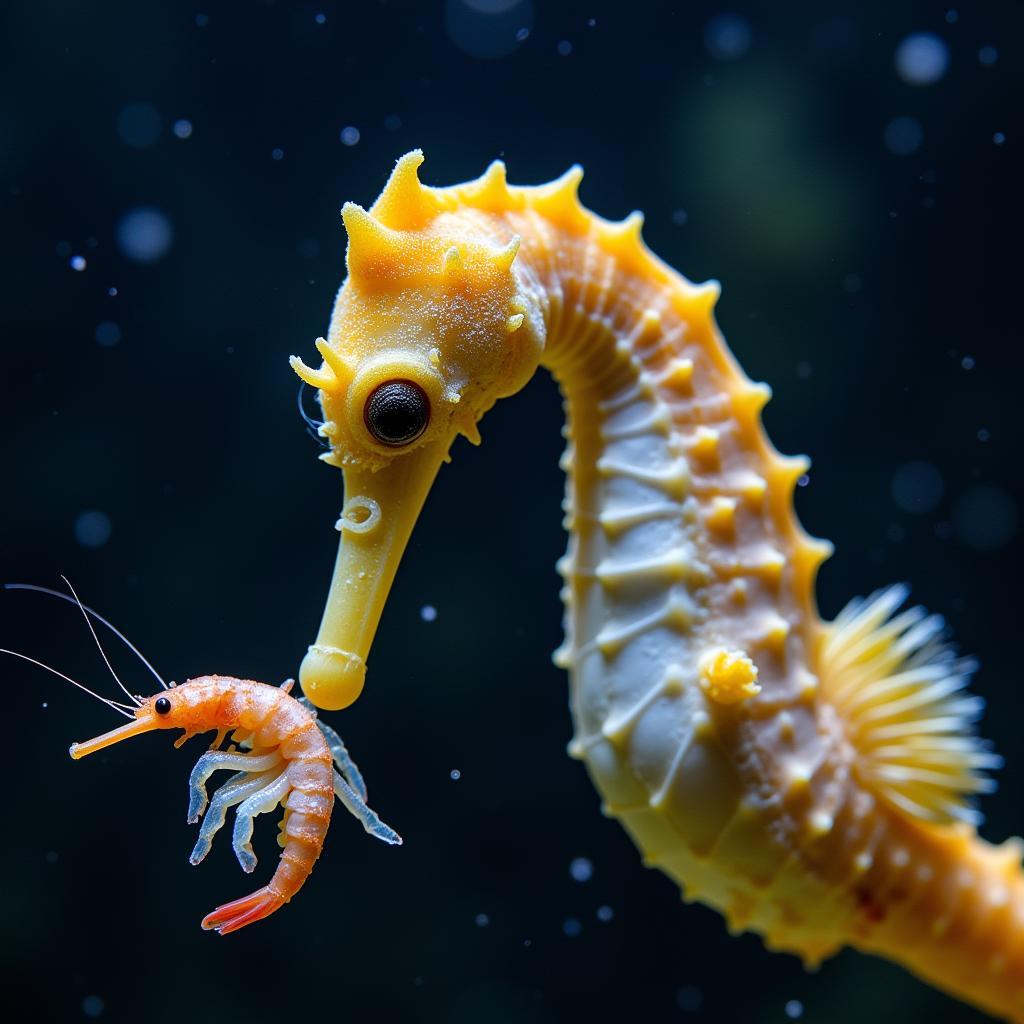Sea Horse Tips are crucial for anyone considering keeping these fascinating creatures in a home aquarium. From tank setup to feeding habits, understanding their unique needs is paramount to ensuring their health and well-being. This comprehensive guide will delve into everything you need to know about sea horse care, offering practical advice and insights to help you create a thriving environment for these delicate marine animals.
Creating the Perfect Sea Horse Habitat: Tank Setup and Water Parameters
Sea horses are not strong swimmers, so a tank with a gentle water flow is essential. Avoid strong currents that could exhaust them. A tall tank is preferred, mimicking their natural upright posture and providing ample vertical swimming space. Live rock and macroalgae are excellent additions, offering hiding places and mimicking their natural environment. Remember, a properly cycled tank is crucial before introducing any seahorses. Test your water regularly to maintain optimal parameters, including specific gravity, pH, and temperature, which are vital for their survival. Choosing appropriate tank mates is also critical. Avoid aggressive species that might compete for food or injure these delicate creatures.
Feeding Your Sea Horses: A Guide to Proper Nutrition
 Feeding Sea Horses Properly
Feeding Sea Horses Properly
Sea horses require a specialized diet consisting of live or frozen foods, such as mysis shrimp, brine shrimp, and enriched copepods. They are slow eaters and require multiple feedings throughout the day. Using a feeding pipette or target feeding station can ensure they get enough to eat without competition from other tank inhabitants. Observe their eating habits and adjust the feeding schedule as needed to prevent overfeeding or underfeeding. If you’re thinking about getting a homemade horse hay feeder, remember that seahorses have different dietary requirements!
Common Sea Horse Health Issues and Prevention
Sea horses are susceptible to various diseases, including fin rot and bacterial infections. Maintaining excellent water quality and providing a stress-free environment are crucial preventative measures. Quarantining new arrivals before introducing them to the main tank can help prevent the spread of disease. If you notice any signs of illness, such as lethargy, loss of appetite, or unusual swimming behavior, consult a veterinarian specializing in aquatic animals. Early detection and treatment are vital for a positive outcome. Just as knowing the best halters for horses is important for their well-being, understanding sea horse health is critical for their survival.
Understanding Sea Horse Behavior: Social Interactions and Breeding
Sea horses are known for their unique monogamous mating rituals. They often form pair bonds and engage in elaborate courtship displays. If you’re interested in breeding sea horses, research their specific breeding requirements and provide a suitable environment. While some species are more social, others can be territorial, especially during breeding season. Understanding their social dynamics can help prevent conflicts and create a harmonious tank environment.
“Providing a stable and enriching environment is crucial for the well-being of seahorses,” says Dr. Amelia Reed, a marine biologist specializing in seahorse conservation. “Paying attention to their unique needs will reward you with the opportunity to observe these captivating creatures thrive.”
“Remember,” adds Dr. Reed, “regular monitoring of water parameters and careful observation of their behavior are key to early detection of potential health problems.” This meticulous approach, similar to the care needed for choosing a horse fly sheet with neck cover, emphasizes the importance of specialized knowledge.
Conclusion: Essential Sea Horse Tips for Success
Caring for sea horses can be rewarding but requires dedication and attention to detail. By following these sea horse tips and understanding their unique requirements, you can create a thriving and healthy environment for these fascinating creatures. Remember, responsible sea horse ownership involves continuous learning and adaptation to ensure their long-term well-being. Think of it like attending the Fredericksburg TX horse races 2023 – preparation is key to a successful experience.
FAQs
- What is the ideal tank size for seahorses?
- What type of filtration is best for a seahorse tank?
- How often should I feed my seahorses?
- Can seahorses be kept with other fish?
- What are the signs of a healthy seahorse?
- How do I breed seahorses?
- What are the common diseases affecting sea horses?
For further assistance, contact us at Phone: 0772127271, Email: justushorses@gmail.com, or visit our address: QGM2+WX2, Vị Trung, Vị Thuỷ, Hậu Giang, Việt Nam. Our customer service team is available 24/7.